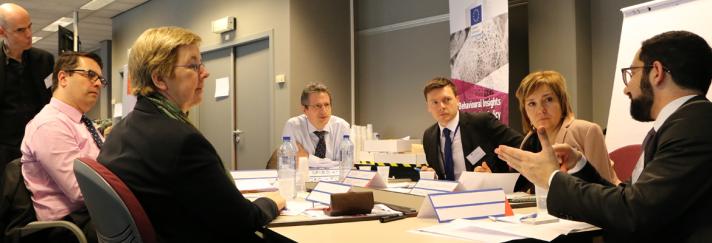
Following the publication of the Report ‘Behavioural Insights Applied to Policy’, on February 23rd the EU Policy Lab organised a workshop with European government representatives in Brussels. Amongst those in attendance were 34 government representatives from 21 European countries, OECD staff members and colleagues from the European Commission.
The workshop aimed at raising awareness on how behavioural insights are increasingly being applied to policies across Europe and their potential for making policy interventions more effective. The event was also meant to create a community of policy-practitioners by providing opportunities for knowledge- and experience-sharing, with a view to exploring possible avenues for collaboration.
Group discussions and mutual learning
The workshop was organised around a series of sessions that fostered group discussions and mutual learning. The application of behavioural approaches was discussed in relation to a variety of policy fields, including:
• Consumer Protection – How to improve consumers’ understanding of the risk/reward profile of financial products? How to encourage consumers to use Alternative and Online Dispute Resolution procedures?
• Environment – How to incentivize consumers to dispose products in a more environmentally friendly way?
• Taxation – How to increase tax compliance?
• Employment – How to apply behavioural insights to recruitment and have more inclusive work environments?
• Health – How to tackle obesity?
• Public Sector Modernisation and Reform – How to encourage staff to embrace changes to administrative procedures?
Improving the effectiveness of polices across the EU: The case of behavioural insights
This was followed by a presentation by Baudouin Regout (Secretariat-General, European Commission) on “Improving the effectiveness of polices across the EU: The case of behavioural insights.” Baudouin provided several examples of how behavioural insights complement more traditional policy approaches by understanding how and under which circumstances individuals react to different policies. The presentation also shed light on how behavioural insights can support all stages of the policy process: conception, implementation, evaluation and enforcement.
In the last session of the day, participants worked in small groups and discussed how cooperation across Europe in the use of behavioural insights for policy could be further enhanced. The discussions focused on three main issues: access to relevant behavioural evidence; synergies between governments working on behavioural insights; and collaboration between policy-makers and research institutions with expertise in the field of behavioural sciences.
We thank all the participants for their time and valuable contributions. We encourage the community of practitioners present during this event to continue to engage in discussion, build on the outputs of the workshop, and that there will be greater collaboration between academics and policy-makers in the application of behavioural sciences in policy.
Details
- Publication date
- 29 February 2016
- Author
- Joint Research Centre
- EU Policy Lab tags




